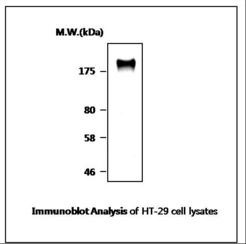CEACAM5 / CD66e Antibody (clone 36H1)
Mouse Monoclonal Antibody
- SPECIFICATION
- CITATIONS
- PROTOCOLS
- BACKGROUND

Application
| WB, IHC-P, E, IP |
|---|---|
| Primary Accession | P06731 |
| Reactivity | Human |
| Host | Mouse |
| Clonality | Monoclonal |
| Clone Names | 36H1 |
| Calculated MW | 77kDa |
| Dilution | IHC-P (1:200), WB (1:2000), |
| Gene ID | 1048 |
|---|---|
| Other Names | Carcinoembryonic antigen-related cell adhesion molecule 5, Carcinoembryonic antigen, CEA, Meconium antigen 100, CD66e, CEACAM5, CEA |
| Reconstitution & Storage | Long term: -20°C; Short term: -20°C |
| Precautions | CEACAM5 / CD66e Antibody (clone 36H1) is for research use only and not for use in diagnostic or therapeutic procedures. |
| Name | CEACAM5 |
|---|---|
| Synonyms | CEA |
| Function | Cell surface glycoprotein that plays a role in cell adhesion, intracellular signaling and tumor progression (PubMed:10864933, PubMed:10910050, PubMed:2803308). Mediates homophilic and heterophilic cell adhesion with other carcinoembryonic antigen-related cell adhesion molecules, such as CEACAM6 (PubMed:2803308). Plays a role as an oncogene by promoting tumor progression; induces resistance to anoikis of colorectal carcinoma cells (PubMed:10910050). |
| Cellular Location | Cell membrane; Lipid-anchor, GPI-anchor. Apical cell membrane. Cell surface Note=Localized to the apical glycocalyx surface |
| Tissue Location | Expressed in columnar epithelial and goblet cells of the colon (at protein level) (PubMed:10436421). Found in adenocarcinomas of endodermally derived digestive system epithelium and fetal colon. |
| Volume | 50 µl |

Thousands of laboratories across the world have published research that depended on the performance of antibodies from Abcepta to advance their research. Check out links to articles that cite our products in major peer-reviewed journals, organized by research category.
info@abcepta.com, and receive a free "I Love Antibodies" mug.
Provided below are standard protocols that you may find useful for product applications.
Background
Cell surface glycoprotein that plays a role in cell adhesion and in intracellular signaling. Receptor for E.coli Dr adhesins.
References
Beauchemin N.,et al.Mol. Cell. Biol. 7:3221-3230(1987).
Barnett T.,et al.Genomics 3:59-66(1988).
Schrewe H.,et al.Mol. Cell. Biol. 10:2738-2748(1990).
Grimwood J.,et al.Nature 428:529-535(2004).
Oikawa S.,et al.Biochem. Biophys. Res. Commun. 142:511-518(1987).
If you have used an Abcepta product and would like to share how it has performed, please click on the "Submit Review" button and provide the requested information. Our staff will examine and post your review and contact you if needed.
If you have any additional inquiries please email technical services at tech@abcepta.com.













 Foundational characteristics of cancer include proliferation, angiogenesis, migration, evasion of apoptosis, and cellular immortality. Find key markers for these cellular processes and antibodies to detect them.
Foundational characteristics of cancer include proliferation, angiogenesis, migration, evasion of apoptosis, and cellular immortality. Find key markers for these cellular processes and antibodies to detect them. The SUMOplot™ Analysis Program predicts and scores sumoylation sites in your protein. SUMOylation is a post-translational modification involved in various cellular processes, such as nuclear-cytosolic transport, transcriptional regulation, apoptosis, protein stability, response to stress, and progression through the cell cycle.
The SUMOplot™ Analysis Program predicts and scores sumoylation sites in your protein. SUMOylation is a post-translational modification involved in various cellular processes, such as nuclear-cytosolic transport, transcriptional regulation, apoptosis, protein stability, response to stress, and progression through the cell cycle. The Autophagy Receptor Motif Plotter predicts and scores autophagy receptor binding sites in your protein. Identifying proteins connected to this pathway is critical to understanding the role of autophagy in physiological as well as pathological processes such as development, differentiation, neurodegenerative diseases, stress, infection, and cancer.
The Autophagy Receptor Motif Plotter predicts and scores autophagy receptor binding sites in your protein. Identifying proteins connected to this pathway is critical to understanding the role of autophagy in physiological as well as pathological processes such as development, differentiation, neurodegenerative diseases, stress, infection, and cancer.



